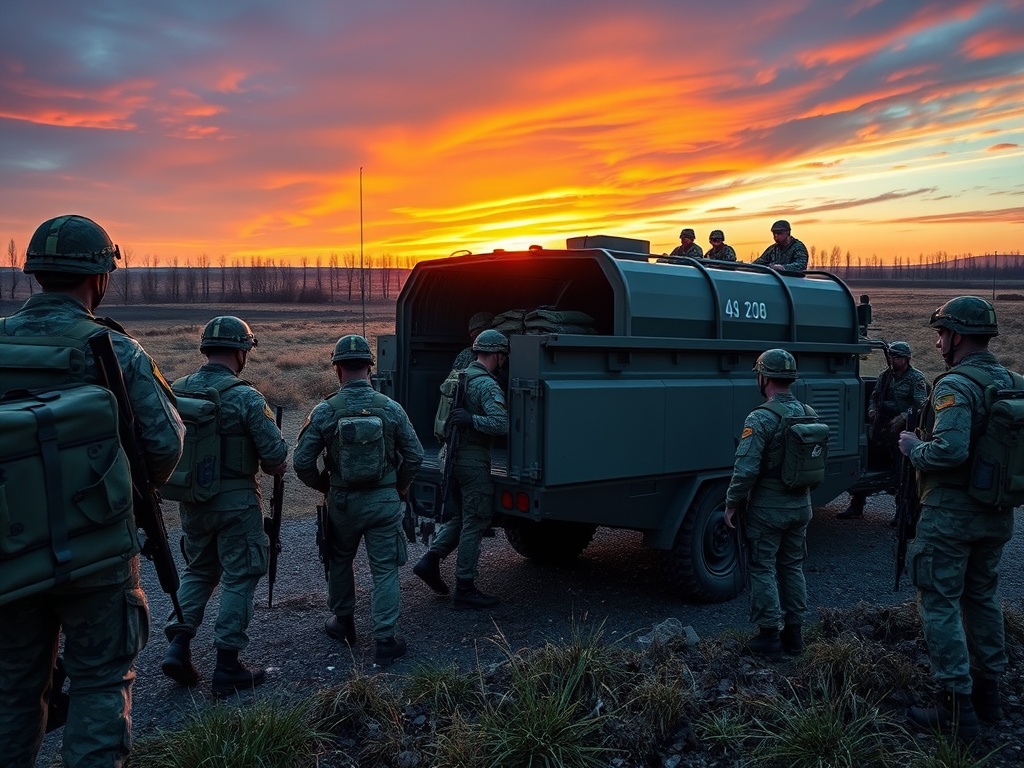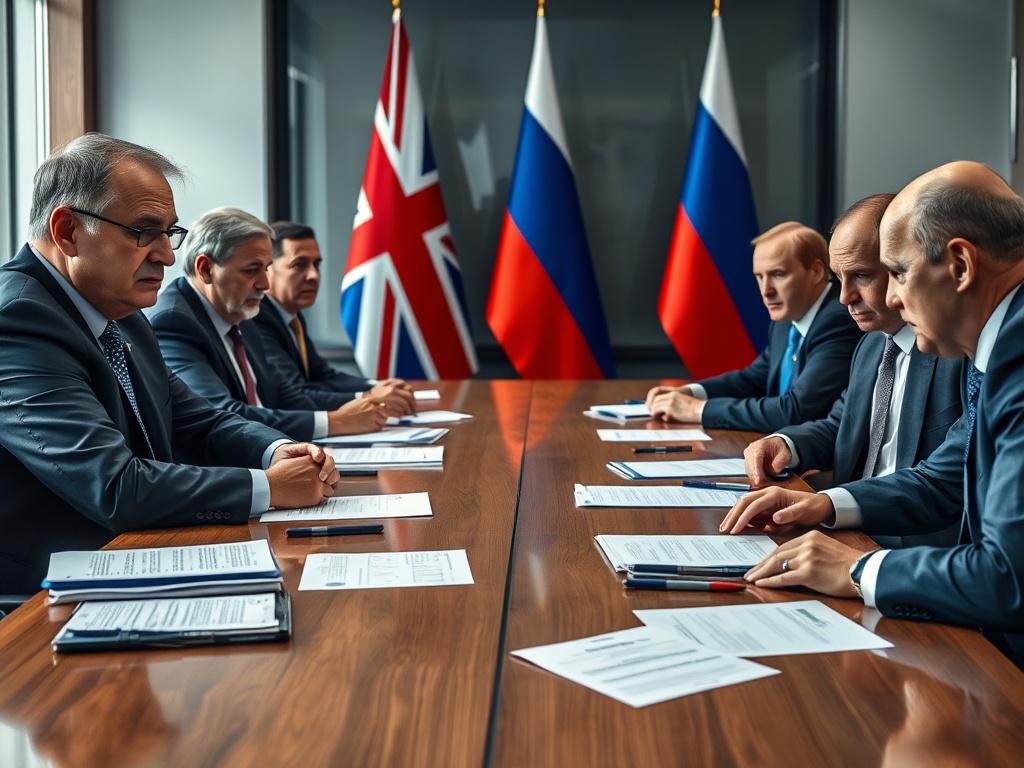UK on Course for Confrontation with Russia Over Ukraine Peacekeeping Plans
The United Kingdom finds itself on a potentially contentious path with Russia as Labour leader Sir Keir Starmer intensifies his advocacy for a peacekeeping force in Ukraine, which would include British military personnel. In a significant diplomatic move, Prime Minister Rishi Sunak is set to urge former President Donald Trump to pledge US military backing as a crucial “backstop” for any prospective peace agreement aimed at concluding the ongoing conflict in Ukraine during his visit to the White House next month.
Western leaders believe that an effective peacekeeping operation must send a clear message to Russia: any violation of the peace agreement would result in a robust military response, with the US military prepared to support that response, even if it does not deploy troops directly into Ukraine. A source from the UK Government remarked, “The guarantee is essential to ensure that the Russians feel the deterrent effect. This is the deal we envision, and it’s a key topic for our discussions in Washington next week. We must ascertain that there is a substantial US backstop.”
As discussions unfold, European nations remain divided on the prospect of sending troops to bolster Kyiv against a potential renewed Russian invasion. The UK and France appear most supportive of the initiative, while Germany’s involvement may depend on the results of its upcoming elections.
In a recent exchange with the Trump administration in Saudi Arabia, Russian Foreign Minister Sergei Lavrov expressed strong opposition to the idea of Western troops overseeing any agreement in Ukraine. He stated, “We explained today that the presence of armed forces from NATO countries, even under a different banner, such as the European Union or national flags, remains unacceptable to us.” Lavrov’s comments underscore the stark differences between Russia and the UK regarding the enforcement of any peace accord, as Starmer navigates the complex task of persuading the US President to maintain a commitment to Ukraine’s defense.
Defence Secretary John Healey emphasized the necessity of American military support to ensure that Russia does not launch further assaults. He noted, “We require a security guarantee for Ukraine, situated within Ukraine, that can deliver on President Trump’s commitments for a sustainable peace, which necessitates an end to Russian aggression and prevents its recurrence in the future. European nations must lead this initiative, but they will need a US backstop, as only the US can provide the deterrent necessary to prevent Putin from striking again.”
H.R. McMaster, a former US Army general who served as national security adviser during Trump’s initial term, predicted that American troops would ultimately play a protective role in Ukraine following any peace settlement. He remarked, “I foresee de facto US security guarantees, if not formal ones. If NATO forces are deployed in Ukraine under a ceasefire, we should re-establish our naval presence in the Black Sea, for instance. The US could provide security from the outside, and should a NATO force come under attack, it would invoke the collective defense principle—an attack on one is an attack on all. I believe the US could neutralize every Russian position outside its borders within a matter of hours, and Russia is well aware of this.”
The specific composition of a multinational peacekeeping contingent is still under negotiation, especially after an inconclusive summit in Paris hosted by President Emmanuel Macron earlier this week. A NATO official stated, “This is a conversation we should have initiated last year or sooner, but it is better late than never. A coalition of willing nations will be necessary, ideally led by the UK or France.”
France is organizing a follow-up meeting on Wednesday, extending invitations to additional European nations that were not present at the previous gathering, including NATO ally Canada. Countries such as Norway, Canada, Lithuania, Estonia, Latvia, the Czech Republic, Greece, Finland, Romania, Sweden, and Belgium are expected to participate, with some officials likely attending via video link. There was reported dissatisfaction among certain nations regarding the exclusivity of the first meeting, which featured only selected leaders rather than a comprehensive EU summit.
German Chancellor Olaf Scholz criticized those publicly advocating for troop deployments to Ukraine, while acknowledging that his Defence Minister, Boris Pistorius, suggested Germany may consider contributing troops to such an operation. Meanwhile, Italy and Poland’s leaders have expressed reservations about the idea of their troops confronting Russia directly.
Nevertheless, insiders within Whitehall remain hopeful that European allies will adopt a more assertive stance once the Trump administration’s position becomes clearer as negotiations with the Kremlin advance. Additionally, there are indications that the UK and the EU may finalize an agreement to enhance cooperation on “industrial coordination,” particularly in the production of armaments and munitions, which would expedite replenishing the supplies depleted during the conflict in Ukraine.
Defence Secretary Healey has vowed to “rearm Britain” and revealed plans to save £10 billion from the defense budget by modernizing military equipment. He added, “As European nations, we recognize the necessity to increase our contributions to security, defense spending, and support for Ukraine.”
Former Conservative leader Sir Iain Duncan Smith, who recently visited Ukraine, criticized the UK’s defense spending as having been insufficient for over a decade. He stated, “We have failed Ukraine. We have been the foremost supporter of their efforts, surpassing even America in some respects, but we have lacked the resources to provide them with everything they need due to our own military underfunding.” Sir Iain further asserted, “The prolonged nature of this conflict, which has lasted three years, is partly due to a collective indecision among Western powers about whether they genuinely wish for Ukraine to emerge victorious. If they intend for Ukraine to win this war—and I firmly believe they can, having witnessed their capabilities firsthand—then they must outgun the Russians. Currently, they lack the necessary ammunition and weaponry.”
Analysis: Perspectives from Across Europe

Germany:
Chancellor Olaf Scholz described the discussions about troop deployments as “irritating” and characterized the focus on such debates as “incomprehensible” at this juncture. Facing elections on Sunday, Scholz’s cautious approach to sending military personnel and arms to Ukraine remains evident. However, Defence Minister Pistorius indicated last month that Germany might consider contributing forces to a peacekeeping mission.
Italy:
Italian Prime Minister Giorgia Meloni expressed to fellow leaders that the notion of sending European troops to Ukraine was “the most complex and least likely to be effective” among various options.
Denmark:
Prime Minister Mette Frederiksen of Denmark stated that she is “open to discussing many different things,” including troop deployments but cautioned that numerous issues need clarification before reaching such a decision.
Spain:
Spain has remained particularly cautious, with Foreign Minister José Manuel Albares asserting, “Nobody is currently considering sending troops to Ukraine.”
Poland:
Prime Minister Donald Tusk indicated that Poland is not prepared to send troops primarily due to the need to secure its own border with Belarus, a state closely aligned with Putin.
Estonia:
Only the Baltic states have so far shown support for the proposal, contingent upon a broader mission involving other allies. Estonia’s Defence Minister Hanno Pevklur mentioned that European partners are “in a very early stage” of developing plans for peacekeeping troop deployments to Ukraine.
Netherlands:
The Dutch have begun to debate the issue, with Prime Minister Dick Schoof suggesting it would be “unwise” not to consider participation in a potential military mission in Ukraine, while Geert Wilders, leader of the far-right PVV, opposed the idea.
Norway:
Norwegian Prime Minister Jonas Gahr Støre remarked that “the time had not come” to discuss sending Norwegian soldiers to Ukraine.
Sweden:
Swedish Foreign Minister Maria Malmer stated she did “not rule out” the possibility of deploying peacekeeping forces to Ukraine.
By Leo Cendrowicz




